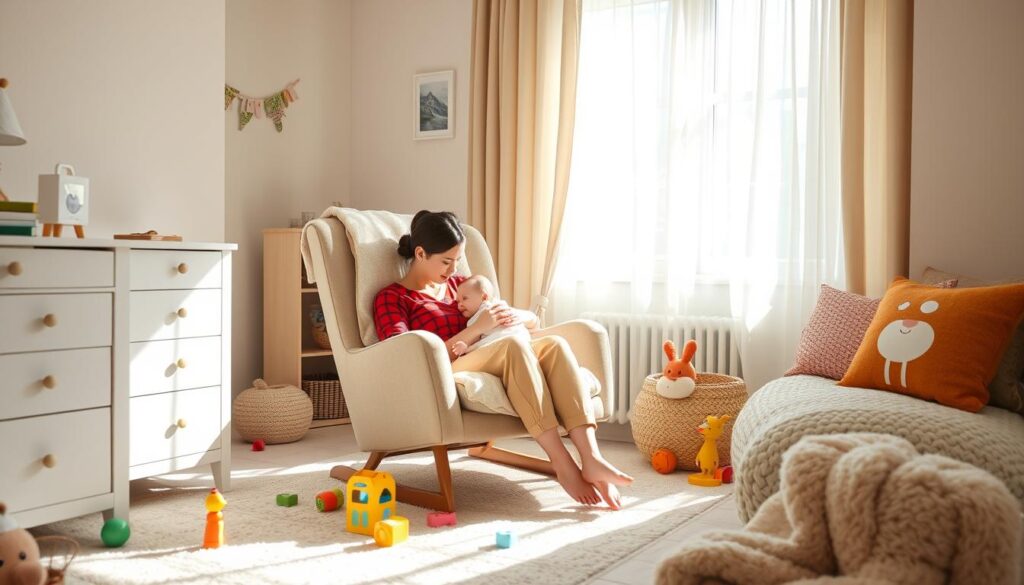What if the secret to a lifelong bond with your baby is in simple activities? Bonding with your baby is key for their emotional and mental growth. It can be done through skin-to-skin contact, play, and talking. Understanding the importance of parent-child attachment helps build a strong bond.
As you start your parenting journey, you might wonder how to bond with your baby. The good news is bonding is easier than you think. It begins with simple activities that strengthen your bond. By using effective baby bonding techniques, you can create a lifelong connection with your baby.
Key Takeaways
- Simple activities like skin-to-skin contact and play can help you bond with your baby
- Parent-child attachment is vital for your baby’s emotional and psychological growth
- Effective communication is key to strengthening your bond with your baby
- Baby bonding techniques can be part of your daily routine
- A strong bond with your baby can have a lasting impact on their life
- Bonding with your baby is essential for their overall well-being
Understanding the Importance of Baby Bonding
As a new parent, it’s key to understand the importance of bonding with your baby. The early days and weeks are critical for building a strong connection. This connection can greatly impact your child’s emotional and psychological growth. Engaging in activities that promote bonding can help create a loving relationship with your baby.
The bond between a parent and child is very important. Studies show that a strong bond can lead to better emotional control, increased trust, and a stronger relationship. Some benefits of bonding with your baby include:
- Enhanced emotional intelligence
- Improved communication skills
- Increased sense of security and trust
- Better social and emotional development
By focusing on bonding activities like skin-to-skin contact and eye contact, you can lay a strong foundation for your child’s future. Remember, bonding is not just for the early days. It’s about building a lifelong connection that will benefit your child in many ways.
As you journey through parenthood, it’s important to stay updated on baby bonding research. This way, you can make informed choices to nurture your bond with your baby. This will give them the best start in life.
Creating Daily Routines to Bond with Your Baby
Creating a daily routine is key to building a strong bond with your baby. Activities like feeding, bathing, and playtime give your baby security and predictability. This is vital for their emotional growth and helps strengthen parent-child bond.
To build a daily routine that fosters bonding, consider these activities:
- Feeding: Use this time to connect with your baby, maintaining eye contact and talking to them in a soothing voice.
- Bathing: Make bath time a relaxing and enjoyable experience for your baby, using gentle movements and warm water.
- Playtime: Engage in play activities that stimulate your baby’s senses, such as reading, singing, and playing with toys.
By adding these activities to your daily routine, you can strengthen parent-child bond. Remember to be flexible and adjust your routine as your baby grows. With consistency and patience, you can build a strong bond with your baby that will last a lifetime.
As you set up your daily routine, remember that every baby is unique. What works for one may not work for another. Be open to trying new activities and adjusting your approach as needed. This way, you can create a routine that promotes bonding and meets your baby’s individual needs.
| Activity | Benefits |
|---|---|
| Feeding | Promotes eye contact and soothing interaction |
| Bathing | Relaxes and calms the baby |
| Playtime | Stimulates senses and encourages development |
Skin-to-Skin Contact: The Foundation of Connection
Exploring ways to bond with your baby? Skin-to-skin contact is a powerful method. It involves holding your baby against your bare chest. This creates warmth and comfort, laying a strong foundation for your bond.
Benefits of Skin-to-Skin Time
Studies show skin-to-skin contact reduces stress and improves heart rates. It also boosts oxytocin, the “love hormone.” This makes it a great way to bond with your baby from birth.
When and How to Practice Skin-to-Skin
Practice skin-to-skin during feeding times for bonding. It’s also good during quiet moments like after a bath or before bed. This strengthens your connection.

Making the Most of Feeding Times
Feeding times are perfect for skin-to-skin contact. Holding your baby close and making eye contact strengthens your bond. Being present and engaged is key to a strong parent-child attachment.
| Benefits of Skin-to-Skin Contact | Description |
|---|---|
| Reduced Stress | Skin-to-skin contact can help reduce stress and promote relaxation in both you and your baby. |
| Improved Heart Rate | Regular skin-to-skin contact can help regulate your baby’s heart rate, promoting a sense of calm and well-being. |
| Increased Oxytocin Levels | Oxytocin is often referred to as the “love hormone,” and skin-to-skin contact can help increase its levels, promoting feelings of love and attachment. |
Playful Activities That Strengthen Your Bond
Doing infant bonding activities is key to a strong bond with your baby. Playtime is full of interaction, laughter, and fun. It’s great for building a lasting relationship. Try reading, singing, and playing with toys with your baby.
The importance of bonding with baby is huge. Playful activities in your daily routine help a lot. They boost cognitive development, motor skills, and bring joy and connection. Here are some fun ideas:
- Reading together: Choose books with colorful pictures and engaging textures to stimulate your baby’s senses.
- Singing and dancing: Put on some upbeat music and dance with your baby, or sing lullabies to help them relax.
- Playing with toys: Try using soft toys, rattles, or sensory balls to encourage exploration and discovery.
Remember, the most important thing is to have fun and be present with your baby. This way, you can strengthen your bond and make lasting memories. 
| Activity | Benefits |
|---|---|
| Reading | Promotes cognitive development and language skills |
| Singing and dancing | Encourages motor skills and creativity |
| Playing with toys | Develops problem-solving skills and hand-eye coordination |
Using Touch and Massage to Connect
Touch and massage are key for bonding with your baby. They help build a strong parent-child relationship. Regular massage can also reduce stress and improve sleep.
Start with simple massage techniques for your baby. Begin with the head, neck, and shoulders. Use gentle, soothing motions. As you get better, you can massage other areas like arms, legs, and back. Always watch your baby’s cues and adjust your touch.

- Reduced stress and anxiety
- Improved sleep quality
- Enhanced parent-child attachment
- Increased sense of calm and relaxation
Massage can greatly benefit your bond with your baby. It can make your relationship stronger and more loving. Every moment you spend with your baby is important. Even small gestures can make a big difference.
Communication Methods to Bond with Your Baby
Building a strong bond with your baby is a journey. Effective communication is key. Learning to connect with your baby through different methods can make your relationship stronger. One great way is baby talk, using a high-pitched voice and simple words to show feelings and needs.
Baby talk helps you feel closer to your baby. It’s a start to a lasting bond. Eye contact, touch, and facial expressions are also important. They help you understand and meet your baby’s needs, building trust and a strong bond.

Reading and singing together are also great for bonding. They offer chances for interaction and help your baby grow. These activities boost your baby’s brain and language skills, making you closer.
Effective Communication Strategies
- Use baby talk to convey emotions and needs
- Utilize non-verbal communication strategies such as eye contact and touch
- Read and sing together to stimulate cognitive development and improve language skills
By using these strategies, you can create a strong bond with your baby. This bond brings joy and fulfillment. Remember, building a strong bond takes patience, love, and good communication. But the rewards are worth it.
Building Trust Through Responsive Parenting
As you keep bonding with your baby, building trust is key. This means paying close attention to your baby’s needs and signals. It helps them feel safe and secure. By responding to their coos, cries, and gestures, you foster a loving bond. This bond is vital for their emotional and mental growth.
Here are some ways to strengthen parent-child bond:
- Responding to your baby’s cries and comforting them when they’re upset
- Engaging in activities that promote parent-child attachment, such as skin-to-skin contact and baby massage
- Using soothing voice tones and gentle touch to calm your baby
Being responsive to your baby’s needs lays a strong foundation for your bond. It’s based on trust, love, and understanding. This positive start can help your baby feel secure and confident as they grow and discover the world.

Every moment with your baby is a chance to grow your connection. By being there, listening, and responding, you build a lifelong bond. It’s one of trust, love, and respect.
Overcoming Common Bonding Challenges
As you bond with your baby, you might face some hurdles. Stress, busy schedules, and work can make it tough to connect. But, making bonding a priority and finding time for activities that strengthen your bond is key.
Managing stress is vital for a strong bond with your baby. Reducing stress helps create a better environment for your baby. Try taking breaks, practicing self-care, and asking for help from family and friends. Simple actions like skin-to-skin contact, playing, and talking can also deepen your bond.

Time can be a big challenge for parents. Busy lives make it hard to find quality time with your baby. But, you can make the most of small moments. Use times like feeding, bath time, or bedtime to bond with your baby.
| Challenge | Solution |
|---|---|
| Parental Stress | Practice self-care, take breaks, and seek support |
| Time Constraints | Make the most of everyday moments, prioritize quality time |
| Work-Related Challenges | Find working parent solutions, such as flexible work arrangements or childcare support |
By tackling common bonding challenges and focusing on bonding activities, you can build a strong bond with your baby. This approach helps create a lifelong connection, using effective baby bonding techniques and understanding the importance of bonding.
Conclusion: Nurturing Your Connection Every Day
Every moment with your baby is important. By adding simple yet meaningful activities to your day, you can build a strong bond. This bond is the start of a lifelong connection.
Baby bonding benefits last long, helping your child grow in many ways. It shapes their social, emotional, and cognitive skills.
Activities like skin-to-skin contact, playful interactions, and talking can strengthen your bond. Nurturing your connection with your baby is a gift that keeps giving. It’s a chance to grow closer and create a lasting bond.
Be ready for challenges and be patient. Cherish every moment. With love and dedication, you’ll create a safe space for your child to grow and thrive.
